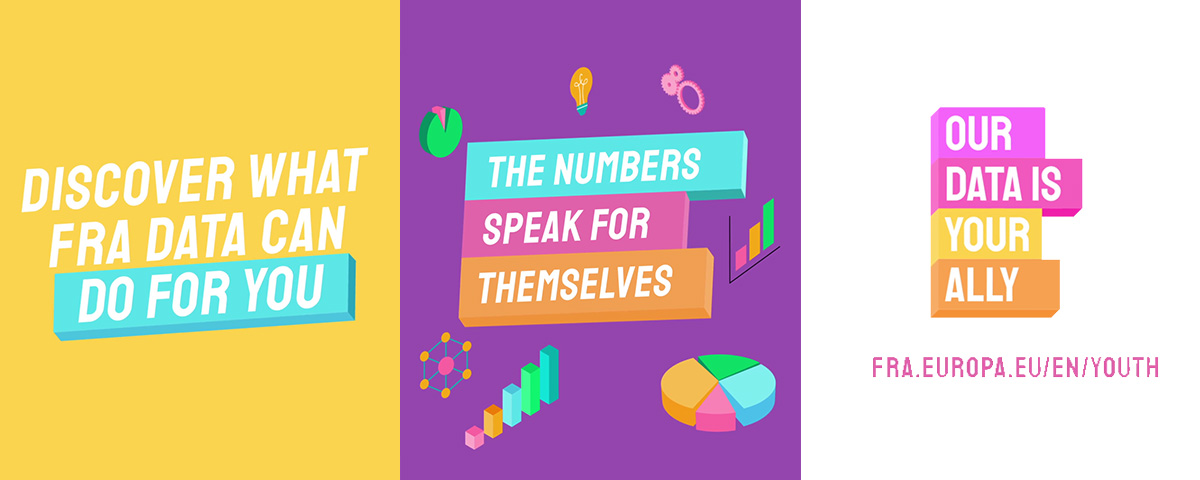
- Democracy
-
We asked young people across the EU about their experiences, perceptions and opinions on democracy and a range of human rights issues:
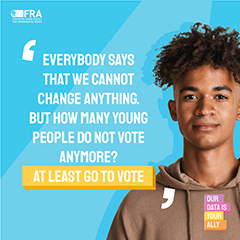
- Human rights - 89% of young people believe that human rights are important for creating a fairer society in their country.
- Feeling left behind - 56% think that politicians do not care about them.
- Free elections - 80% consider free and fair elections important but only 54% say it is important that voters discuss politics with other people before voting.
- Politics - 58% consider it important that opposition parties freely criticise the government. This compares to 69% of people 65 years and older.
- Corruption - 48% of young people find it acceptable to give a gift or do a favour, compared with under 35% in other age groups.
See our Fundamental Rights Survey and data explorer to learn more.
- Violence against women
-
In our violence against women survey, young women across the EU reveal how common physical, sexual and psychological violence is among women in Europe:
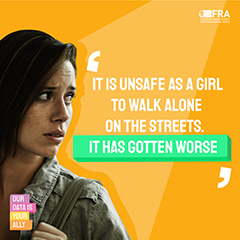
- Violence - 34% of young women experienced violence since the age of 15 and 9% were victims of sexual violence.
- Harassment - 62% of young women (18-29) are sexually harassed.
- Avoiding places - 60% of young women avoid places or situations for fear of being assaulted.
See our violence against women survey and data explorer for more.
FRA’s EU-wide Fundamental Rights Survey asked young women about their experiences with crime and violence.
- Harassment - 61% of young women experience harassment and 20% are victims of violence. Women who struggle to make ends meet experience more harassment and violence.
- Reporting - Most women do not report the incident anywhere. Only 27% of young women reported they were attacked and 11% reported they were harassed.
- Avoiding places - 83% of young women limit where they go or who they spend their time with to protect themselves.
See our Crime, Safety and Victims’ Rights report and Fundamental Rights Survey data explorer to learn more.
- Harassment (cyber-harassment)
-
Our EU-wide Fundamental Rights Survey highlights high levels of harassment among young people.
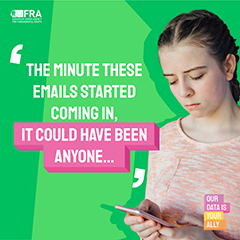
- Harassment - Young people experience harassment at a much higher rate than older people: 61% experience harassment and 27% face cyber-harassment.
- Minorities - Young people with disabilities, ethnic background and LGBTI people tend to experience even higher rates of harassment than people generally. 78 % of young people with disabilities experienced harassment.
- Women - 30% of young women, in contrast to 9% of young men, say that the most recent incident of harassment was sexual.
See our Crime, Safety and Victims’ Rights report and Fundamental Rights Survey data explorer to learn more. See also the survey results video.
- Racism
-
Young people from ethnic minorities experience high levels of racial discrimination, harassment and violence. FRA collected the experiences of people of African descent in 12 EU countries and Muslims in 15 EU countries. Their experiences reveal the persisting racism in today’s societies across the EU.
Experiences of young Black people:
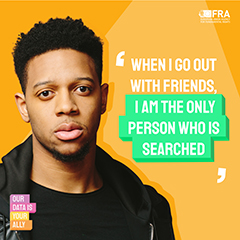
- Racist harassment - 37 % of young Black people experience racist harassment, which is more than older Black people experience.
- Education and work - in some countries, up to 76% young Black people are not in work, education or training, compared to 8% of the general population.
- Discrimination - 39% of young Black people feel discriminated against in their daily lives because of their skin colour, ethnic origin or religion.
See our Being Black in the EU report and data explorer for more.
Experiences of young Muslims:
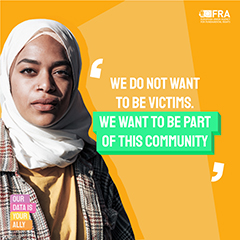
- Harassment - 41% of young Muslims experience harassment, much more than older Muslims.
- Discrimination - 44% of young Muslims felt discriminated against in their daily lives because of their skin colour, ethnic origin or religion.
- Religious symbols - Muslim women who wear headscarves are almost more likely to experience bias-motivated harassment than those who do not.
- Work - 33% of young Muslims who looked for work and 31% of those at work experience discrimination. Muslim women who looked for work most often mention clothing as a reason for discrimination.
See our report on the experiences of Muslims in Europe for more.
- Roma
-
Our Roma surveys highlight widespread inequalities that perpetuate cycles of poverty and exclusion among Roma in Europe.
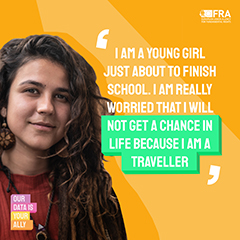
Experiences of Roma in 10 European countries:
- Poverty - 83% of Roma children aged 0-17 live in risk of poverty.
- Living conditions - Roma children are more likely to live in overcrowded households (94%) and households without access to tap water (24%). 29% of Roma children live in households where someone went to bed hungry in the last month.
- Pre-school - only 44% attend early childhood education and care.
- Education - 71% leave the education system early.
- Work - 56% of Roma aged 16–24 were not in employment, education or training, compared with 11% of their non-Roma peers in general.
See our Roma in 10 European Countries Survey report for more.
Experiences of Roma and Travellers in western European countries:
- Living conditions - 23% of Roma and Traveller children live in a household that cannot afford basic items, such as healthy food or heating, or has trouble paying the rent. Many face hunger. And the life expectancy of Roma is 10 years lower than among the general population.
- Schooling - two thirds of young Roma and Travellers complete only lower secondary education and do not continue in further studies. Almost none complete university.
- Discrimination at school - 30% of Roma and Traveller parents say that their children are verbally harassed at school because of their background.
- Discrimination - younger Roma and Travellers feel more discriminated than older ones: 41% feel discriminated against when entering a shop, going to a restaurant, night club or hotel or when looking for a job.
- Work - fewer Roma and Travellers are in paid work, compared with the general population. Employment is particularly difficult for the young. Every second young Roma and Traveller is not in employment, education or training. This applies particularly to young women (58%) rather than young men (36%).
See our Roma and Travellers Survey report for more.
- LGBTI people
-
Our LGBTI survey reveals that many LGBTI people are now more open than before but fear, violence and discrimination remain high.
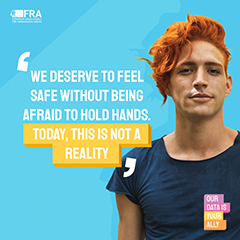
- Harassment - Young LGBTI people experience more harassment than their older peers.
- Schooling - LGBTI issues are now more positively addressed at school: 47% of 15–17-year-olds say that LGBTI issues are addressed at school and 10% say they are addressed negatively. Some 51% say that someone from school harassed them because they were LGBTI. But almost as many (48%) say someone supported them and their rights as LGBTI people at school. This support drops to 33% for people aged 18 to 24 and to 7% for those 40 years and over.
- Discrimination - 53% of young LGBTI people felt discriminated against in at least one area of life one year before the survey. By contrast, 41% of adult respondents (aged 18+) felt so. The share is even higher for young trans (69%) and intersex (62%) respondents.
- Daily life - Young LGBTI people feel more discriminated against in cafés, restaurants, bars or nightclubs than older LGBTI people. 28% of those aged 18 to 24 said they experienced this, compared to 12% of those aged 55+.
- Openness - young LGBTI people are less open about their sexual orientation and gender identity than older ones. Only 12% of those aged 18 to 24, and 5% of those aged 15 to 17, are very open. By comparison, 36% of those aged 55+ are very open.
- Hate - Young LGBTI people (18 – 24 years old) experience the most hate-motivated physical or sexual attacks. 14% of young LGBTI people experienced such an attack compared to 7% of 55+ year olds.
See the LGBTI Survey and LGBTI Survey data explorer to learn more.
- Antisemitism
-
FRA’s survey of Jews in 12 EU countries gathered data on more than 2,700 Jews aged from 16 to 34. It shows how young Jews face harassment in Europe, but nevertheless express their Jewish identity.
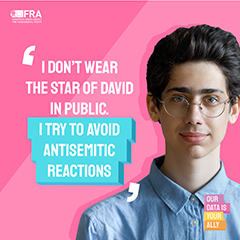
- Antisemitism - 81 % of young Jews say that antisemitism is a problem in their countries and believe it has increased in recent years.
- Social media - 90 % say that the internet and social media is where antisemitism is most problematic today.
- Harassment - 44 % say they were a victim of antisemitic harassment, which is 12% higher than their elders.
- Reporting - 80 % of young Jews do not report harassment to the police or any other authority.
- Religious symbols - 45 % never wear, carry or display distinguishable Jewish items in public because they are concerned about their safety.
- Emigration - 41 % of young Jews considered emigrating because they do not feel safe living in their country.
- Government support - Only 17 % feel that their governments are combating antisemitism effectively.
See our report Young Jewish Europeans: perceptions and experiences of antisemitism for more.
- Access to justice
-
We asked young people across the EU about their experiences, perceptions and opinions on a range of human rights issues, including their views on access to justice.
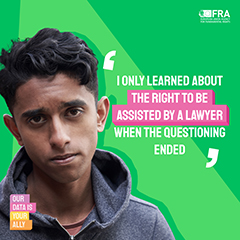
- Reporting - Reporting is a crucial step to access justice. But 65% of young people do not report a physical attack and 80% do not report when they are harassed.
- Environment - 53% of young people are willing to intervene when they witness a crime against the environment, such as illegal dumping.
- Partner violence - 59% would intervene if they witnessed an incident of intimate partner violence.
- Criminal proceedings - Teenagers and children in criminal proceedings are often treated as adults. They are also sometimes questioned without a lawyer and denied assistance.
See our Crime, Safety and Victims’ Rights report, Fundamental Rights Survey data explorer and the Children in Criminal Proceedings report to learn more.
- Disability
-
We asked people across the EU about their experiences, perceptions and opinions on a range of human rights issues. It also captured the views of young people with disabilities (here, respondents who said that they are severely limited in usual activities people do).
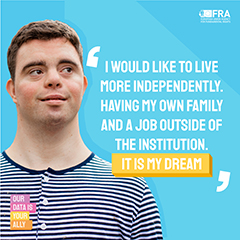
- Feeling left behind - 65 % of young people with disabilities say that mainstream political parties do not care about them.
- Access to public services - 69 % of young people with disabilities have experienced problems accessing public services, compared with 41 % for people without disabilities.
- Physical violence - 55 % of young people with disabilities have experienced physical violence, compared with 18 % of people generally.
- Harassment - 78 % of young people with disabilities experienced harassment compared to 39 % of the general population.
- Consumer fraud – Young people with disabilities experience higher rates of consumer fraud (59 %) than those who do not have such limitations (29 %). They also experience more burglaries and online banking and payment card fraud.
- Avoiding places due to fear of crime - Some young people with disabilities frequently avoid certain streets or areas for fear of being assaulted or harassed – 23 % do this often or all the time, compared with 15 % of people without disabilities.
See our Crime, Safety and Victims’ Rights report and Fundamental Rights Survey data explorer.